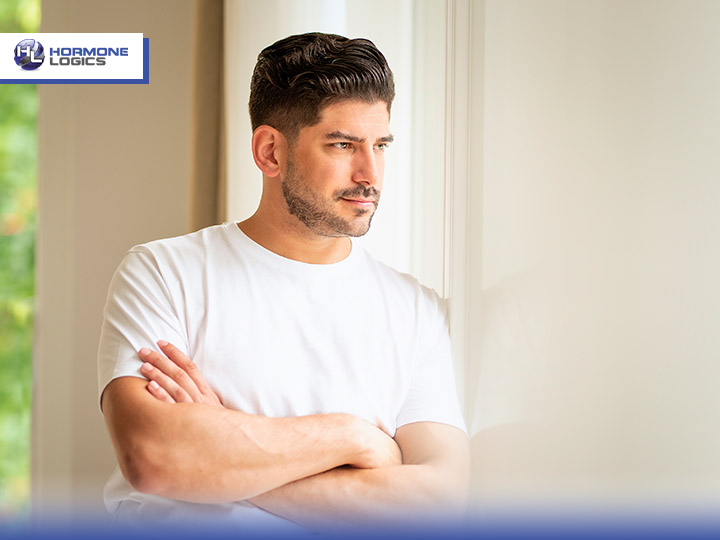Is There a Link Between Obesity and Low Testosterone?
Testosterone replacement therapy can help you to lose weight and otherwise lower the health risks associated with obesity.
Medical research has found that men with low testosterone are more likely to be obese, and conversely, obese men are more likely to be suffering from low testosterone.
It has been well-documented that low testosterone levels and obesity seem to go hand in hand. But why is that? What is the link between low testosterone and obesity?
It has long been known that obesity is linked to a number of other health problems. Being obese increases your risks of diabetes, heart disease, liver disease, and even some forms of cancer. Now, some of the latest research suggests that obesity puts men at greater risk of low testosterone.
Results of a study recently published in the journal Diabetes Care, conducted by the University at Buffalo, showed that 40 percent of obese participants involved in the Hypogonadism in Males (HIM) study had lower-than-normal testosterone readings.
The percentage rose to 50 percent among obese men with diabetes. Results also revealed that as body mass index (BMI) — a relationship of weight-to-height — increased, testosterone levels fell.
“The effect of diabetes on lowering testosterone levels was similar to that of a weight gain of approximately 20 pounds,” says Sandeep Dhindsa, MD, an endocrinology specialist in the UB Department of Medicine and first author on the study.
“In view of the fact that almost one-third of the U.S. is obese, these observations have profound pathophysiological, clinical, epidemiological and public health implications.”
Doctors who treat men with low testosterone, a condition also known as hypogonadism, have long observed a link between obese patients and low testosterone levels.
This study is one of the first large-scale studies to prove that link. In fact, it was the largest analysis of the association between obesity and low testosterone and the first to compare the prevalence of low testosterone with obesity and diabetes separately and together.
The study shows that obesity and diabetes may exert independent influences on testosterone concentrations – but both have a profound testosterone-lowering effect.
All men lose testosterone as they age, with all men over 40 experiencing low testosterone to some degree. One of the interesting things about this study is that it found that men who were obese, or diabetic, or both – had high degrees of low testosterone, regardless of age.
The study results showed a 40 percent higher prevalence of low testosterone in obese men compared to non-obese participants. Men with diabetes, whether obese or not, showed lower levels of testosterone than non-diabetic men across all weight and age categories. Testosterone levels decreased significantly in both diabetic and non-diabetic men as BMI increased.
Testosterone Replacement Therapy and Obesity
 There have been several other studies that indicate a link between low testosterone and obesity. What is the link between low testosterone and obesity? Fat cells metabolize testosterone to estrogen, lowering testosterone levels.
There have been several other studies that indicate a link between low testosterone and obesity. What is the link between low testosterone and obesity? Fat cells metabolize testosterone to estrogen, lowering testosterone levels.
Also, obesity reduces levels of sex hormone-binding globulin (SHBG), a protein that carries testosterone in the blood. Less SHBG means less free testosterone.
This is one of the reasons that losing weight through eating right and exercise can increase testosterone levels. It is also why building muscle and weight loss is one of the many long-term benefits of testosterone replacement therapy.
Here are some of the many other benefits that hundreds of patients are experiencing from testosterone replacement at our West Palm Beach, Florida-based hormone clinics right now.
A 2009 study concluded that “Restoring testosterone levels to within the normal range by using testosterone replacement therapy can improve many of the effects of low testosterone.
Most importantly, these include beneficial effects on mood, energy levels, patients’ sense of well-being, sexual function, lean body mass, muscle strength, bone mineral density (BMD), cognition, and some benefits on cardiovascular risk factors.”
In addition, testosterone replacement therapy has been shown to provide the following:
- Improved skin and hair health
- Increased strength and vitality
- Weight loss
- Improved heart health
- Stronger bones
- Improved sleep
How Do Doctors Treat Low Testosterone?
Low testosterone can be effectively treated with testosterone replacement therapy. You deserve to enjoy an active and healthy lifestyle at any age! But, unfortunately, as men age, your levels of critical hormones like testosterone drop, which harms their ability to enjoy life.
Testosterone replacement therapy is the key to treating the symptoms of low testosterone and getting back what time and nature take away. Hormone Logics has been successfully treating patients with age-related hormone loss with our unique hormone replacement therapies for men and women for many years.
Medical research has shown that testosterone replacement and/or HGH replacement therapy are extremely effective ways to treat age-related hormone decline. Hormone Logics’ HRT treatments for men and women have been proven to offer individuals between the ages of 35 and 65 a greatly improved quality of life.
Our medical director is Mazyar Rouhani, MD. Dr. Rouhani has long been a medical innovator. He is a co-founder of Symptify, an online symptom checker to better educate patients about their conditions. Recently, Dr. Rouhani has focused his endeavors on improving patients’ health using IV fluid hydration.
Using his medical expertise combined with his passion for optimizing each individual’s health and vitality, Dr. Rouhani combines his knowledge and expertise to provide an integrated approach to antiaging medicine to help his patients look and feel their best.
“I was a good 30 pounds overweight. I knew it was affecting my health, but who knew it also was giving me low testosterone? Dr. Rouhani explained to me that it’s a vicious cycle, weight was causing my testosterone to be low, and my low testosterone was making it almost impossible to lose weight. He got me on a program of lifestyle changes, exercise, and testosterone replacement. The weight came off, and now I have lots of energy. I look and feel great and have my life back!
Raymond W., Boca Raton, FL
If you would like to learn a little bit more about the many life-changing benefits of andropause treatment, please contact us today by calling (561) 640-3333.









